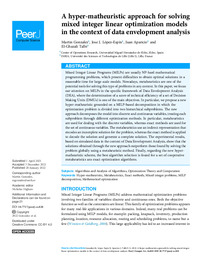Por favor, use este identificador para citar o enlazar este ítem:
https://hdl.handle.net/11000/37427Registro completo de metadatos
| Campo DC | Valor | Lengua/Idioma |
|---|---|---|
| dc.contributor.author | González Espinosa, Martín | - |
| dc.contributor.author | López-Espín, Jose J. | - |
| dc.contributor.author | Aparicio, Juan | - |
| dc.contributor.author | Talbi, El-ghazali | - |
| dc.contributor.other | Departamentos de la UMH::Estadística, Matemáticas e Informática | es_ES |
| dc.date.accessioned | 2025-09-17T07:40:31Z | - |
| dc.date.available | 2025-09-17T07:40:31Z | - |
| dc.date.created | 2022-01-20 | - |
| dc.identifier.citation | PeerJ Computer Science, 8, e828, 2022 | es_ES |
| dc.identifier.issn | 2376-5992 | - |
| dc.identifier.uri | https://hdl.handle.net/11000/37427 | - |
| dc.description.abstract | Mixed Integer Linear Programs (MILPs) are usually NP-hard mathematical programming problems, which present difficulties to obtain optimal solutions in a reasonable time for large scale models. Nowadays, metaheuristics are one of the potential tools for solving this type of problems in any context. In this paper, we focus our attention on MILPs in the specific framework of Data Envelopment Analysis (DEA), where the determination of a score of technical efficiency of a set of Decision Making Units (DMUs) is one of the main objectives. In particular, we propose a new hyper-matheuristic grounded on a MILP-based decomposition in which the optimization problem is divided into two hierarchical subproblems. The new approach decomposes the model into discrete and continuous variables, treating each subproblem through different optimization methods. In particular, metaheuristics are used for dealing with the discrete variables, whereas exact methods are used for the set of continuous variables. The metaheuristics use an indirect representation that encodes an incomplete solution for the problem, whereas the exact method is applied to decode the solution and generate a complete solution. The experimental results, based on simulated data in the context of Data Envelopment Analysis, show that the solutions obtained through the new approach outperform those found by solving the problem globally using a metaheuristic method. Finally, regarding the new hypermatheuristic scheme, the best algorithm selection is found for a set of cooperative metaheuristics ans exact optimization algorithms. | es_ES |
| dc.format | application/pdf | es_ES |
| dc.format.extent | 24 | es_ES |
| dc.language.iso | eng | es_ES |
| dc.publisher | PeerJ | es_ES |
| dc.rights | info:eu-repo/semantics/openAccess | es_ES |
| dc.rights | Attribution-NonCommercial-NoDerivatives 4.0 Internacional | * |
| dc.rights.uri | http://creativecommons.org/licenses/by-nc-nd/4.0/ | * |
| dc.subject | Hyper-matheuristic | es_ES |
| dc.subject | Metaheuristics | es_ES |
| dc.subject | Exact methods | es_ES |
| dc.subject | Mixed integer problems | es_ES |
| dc.subject | MILP decomposition | es_ES |
| dc.subject | Mathematical optimization | es_ES |
| dc.subject.other | CDU::6 - Ciencias aplicadas | es_ES |
| dc.title | A hyper-matheuristic approach for solving mixed integer linear optimization models in the context of data envelopment analysis | es_ES |
| dc.type | info:eu-repo/semantics/article | es_ES |
| dc.relation.publisherversion | https://doi.org/10.7717/peerj-cs.828 | es_ES |

Ver/Abrir:
2022_A hyper-matheuristic approach for solving mixed integer linear optimization models in the context of data envelopment analysis .pdf
3,62 MB
Adobe PDF
Compartir:
 La licencia se describe como: Atribución-NonComercial-NoDerivada 4.0 Internacional.
La licencia se describe como: Atribución-NonComercial-NoDerivada 4.0 Internacional.
.png)